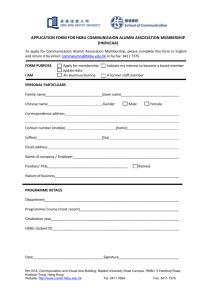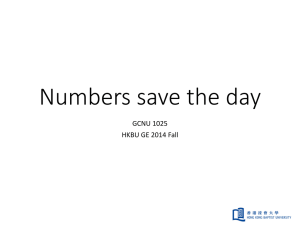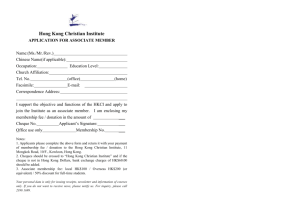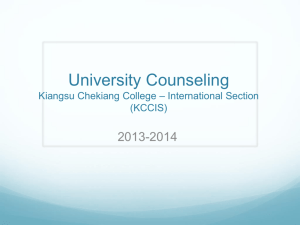Report for the Biennial Conference and 19th General
advertisement
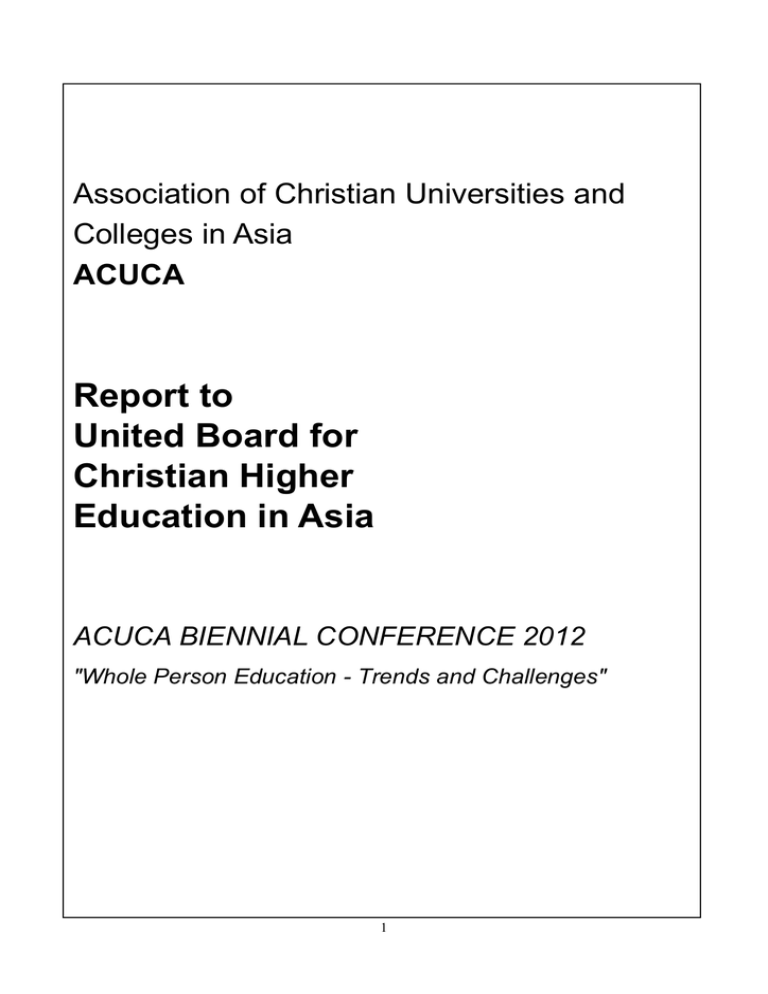
Association of Christian Universities and Colleges in Asia ACUCA Report to United Board for Christian Higher Education in Asia ACUCA BIENNIAL CONFERENCE 2012 "Whole Person Education - Trends and Challenges" 1 Report to the United Board for Christian Higher Education in Asia 1. Name of Institution Submitting Report Association of Christian Universities and Colleges in Asia (ACUCA) 2. School Year During Which Project Was Implemented 2012 academic year 3. Title of Project (Should Be Consistent with Proposal Title) ACUCA Biennial Conference: “Whole Person Education – Trends and Challenges” 4. Abstract or Short Summary of Report The ACUCA Biennial Conference was held at International Christian University and Meiji Gakuin University (Tokyo, Japan) from 26 to 28 October 2012. This conference is held every other year and is timed to take place together with the ACUCA General Assembly. The topic for this conference was “Whole Person Education – Trends and Challenges.” Through keynote lectures and various discussion sessions, participants were able to acquire new information about the idea of whole person education, exchange ideas, and learn ways to put whole person education into practice at their respective institutions. 5. Contact Person and Contact Information (Address, Telephone, Fax, Email) (Present ACUCA President or General Secretary's Contact Information) 6. Description of Activities and Participants (Including Problems Encountered and Solutions Attempted) Participants were the presidents, vice-presidents, chaplains, dean, directors, etc. of ACUCA member institutions. There were 85 participants in total, mostly comprising representatives from 46 universities and colleges across 8 countries and region, but also included representatives from the United Board and the event’s keynote speakers. In terms of problems encountered and solutions attempted, we struggled with the question of how to put together the two-day event so that participants would be able to deepen their understanding of whole person education and the content would be useful and effective for the practical purposes of each college and university. To address this, the event was planned with following programs: • The event was planned with a flow moving from keynote lectures to parallel sessions to plenary session. In the keynote lectures, speakers with extensive knowledge and experience in whole person education gave an overview of the topic. Three parallel sessions were held, each with a difference subtheme; here, participants could exchange ideas freely. The plenary session aimed to summarize the ideas from the keynote lectures and parallel sessions. • In parallel sessions, where participants exchange ideas, discussion can sometimes lack focus and participants can sometimes be reluctant to express their ideas. In order to avoid this, the staff of the ACUCA secretariat met twice with the parallel sessions’ facilitators and support staff before the event and established a mutual understanding. At the start of the parallel 2 sessions, one person was designated to give a presentation, which served as a point of departure for the subsequent discussion. Also, a questionnaire was given in advance about whole person education; information gathered from the questionnaire was given to participants and used as an aide to discussion in these sessions. The conference comprised the following components. a. Keynote Lectures (see attached for details) i. Keynote lecture 1: “The Embattled Academy: Sources of Hope and Renewal,” Dr. Thomas L. Benson (Chairman of the Board, Council for American Culture and Education) ii. Keynote lecture 2: “Educating Young People to Become Whole Persons Befitting the 21st Century – a Report from Hong Kong Baptist University,” Professor Albert S. C. Chan (President and Vice-Chancellor, Hong Kong Baptist University, Hong Kong) b. Parallel Sessions Three parallel sessions (meetings) held in the afternoon of 27 October. i. Theoretical Perspective of Whole Person Education This session looked at whole person education from a theoretical perspective. Professor Mark Langager (International Christian University) served as facilitator. The presentation at the start of the meeting was given by Dr. Loren Agrey, (President, Asia-Pacific International University (Thailand)). Dr. Agrey presented whole person education in the context of the Seventh-day Adventist Church and spoke about how whole person education is incorporated into Asia-Pacific International University for students’ spiritual, ethical and moral development. Participants not only learned how to achieve Whole Person Education and to teach Christianity in a parallel way, but also realized the importance of respecting the diversity of perspectives on education, religion and culture. ii. Practical Perspective of Whole Person Education This session looked at whole person education from a practical perspective. Professor Yoshikazu Hongo (International Christian University) served as facilitator. The presentation at the start of the meeting was given by Professor Budi Widianarko (Rector, Soegijapranata Catholic University (Indonesia)); the title of the presentation was “The Practice of Whole Person Education at Soegijapranata Catholic University.” After discussing what it means to be a Catholic university, Professor Widianarko spoke about the steps it takes after students enter the university. The professor used service learning as an example and spoke about how diverse approaches and alignment with institutions and national mottoes are important in putting whole person education into practice. iii. Technological Perspective of Whole Person Education This session looked at whole person education from a technological perspective. Dr. Joo-Yong Jung (International Christian University) served as facilitator. The presentation at the start of the meeting was given by Dr. Johannes Siregar (Indonesia Christian University); the title of the presentation was “Educational Experiences via Technology – How E-learning Can Be Used in Implementation of Whole Person Education.” Dr. 3 Sireger spoke about changes in the learning environment and gave advice on how technology can be used to put whole person education into practice. After that, there was discussion on the challenges facing whole person education that makes use of technology and means of overcoming those challenges. Through the parallel session, participants were able to acknowledge the wider implication of technology in the younger generation's lives and discuss ways in which we can implement whole person education in helping students cope with the current communication environment. c. Plenary Session At this session, first, facilitators from each parallel session reported on their groups’ discussions. Next, the keynote speakers looked back on the events of the conference and Mr. Jonathan Wolff (Director of Fellowship and Scholarship Programs, United Board) also commented on the event. From this part of the session, the following was discussed. • Q: Is there anything distinctively Christian about “wholistic” education in Christian institutions? A: To keep our identity as Christians we need to look at what we have in common in terms of the development of the whole person, the spiritual development, intellectual excellence and development within the community and the family. • We talk a lot about whole person education for our students, but I think it is also important to focus on whole person education for faculty and staff and to teach faculty members how to provide whole person education. • The faculty and staff need to be trained to provide better instructions or advise. In some institutions they provide guidebooks or guidelines on how to provide whole person education. • Even now in the digital age more and more fragmentation is taking place and it is time to revive the value of education. We should focus on Interpersonal examination and looking at interior lives. • In order to understand the student’s inner feelings dialogue is very important. We should share our values for education and efforts should be made for sharing. • I would like to propose to AUCA that we should set up a database to share the best practices of whole person education to reinforce and help our young people to understand that technology can be used in a fostering way to re-establish connections. • Like the United Nations we have to be the ACUCA community and be the new beacon of the 21st century. 7. Extent to Which Goals and Objectives Were Achieved (Including Qualitative and Quantitative Evaluations; for Scholarships Involving Course Study, Include Transcripts or Copy of Grades) As written in the proposal’s section about the goal for the project, the conference was an ideal opportunity to think about whole person education. We obtained valuable information from the keynote speakers and in the subsequent discussions added depth to our ideas about whole person education. Including the Indian schools still applying to ACUCA, the conference had participants from 46 4 member institutions representing 8 countries and regions. With these participants from over 80% of ACUCA’s membership, the conference offered extremely lively discussion and exchange of ideas. Dr. Joo-Yong Jung, who facilitated the parallel session on technological perspectives, stated, “We did not reach a conclusion, but participants commented that through the session, they were able to rethink the meaning of technology in young generation's everyday lives and the implication for whole person education.” We believe that in this way the statement that the conference was a valuable opportunity to deepen ideas about whole person education expresses the impression of many of the participants. Joint development and agreements for programs between member institutions will take time and have not yet taken concrete form. However, we are confident that participants will make use of ideas discussed at the conference in the educational programs of their respective schools. In consideration of these results, we feel the conference meet 80% of its objectives. 8. Overall Impact of Project and Future Implications For the Christian institutions of higher education in Asia that form ACUCA’s membership, this conference was an extremely valuable opportunity to reaffirm why whole person education is important. In this sense, we feel the conference had a large impact on ACUCA. Participants were able to hear the keynote speakers, who presented whole person education each from his own perspective. In the parallel sessions, they were able to engage in a lively exchange of stimulating ideas. In the overall concluding plenary session, participants had by that time taken a step forward in their understanding of whole person education and became able to think about how it can be put into practice at their own schools. We are confidant that participants’ institutions will offer curricula that have a greater awareness of whole person education. We also believe it is possible to expect that not only each individual school will develop programs influenced by whole person education but that there will be joint programs developed between ACUCA members as well. 9. Financial Report (Preferably Audited, Accounting in Some Detail the Use of Grant Money and Indicating the Amount of Any Balance Left) See attached 10. In addition, audited institutional financial statements for grantee institutions receiving United Board grants of any kind that total $100,000 or more are due by October 31st. N/A Report prepared by:_____________________________ Date:___________________ Submitted by:___________________________________ Date:___________________ Head of Institution 5 (Appendix) Keynote Lecture 1: “The Embattled Academy: Sources of Hope and Renewal” Dr. Thomas L. Benson (Chairman of the Board, Council for American Culture and Education) Outline: Universities currently face various issues and the next several years will be an important time in which it is decided whether some universities are able to continue or not. In financial terms, educational costs are rising dramatically and it is becoming difficult for universities to ensure their facilities and the quality of the education they offer. In terms of mission, a tense relationship is growing out of the space between universities’ founding missions and the needs of parents and students who are looking for good jobs after graduation. And technological terms, with the rapid progress of IT, online universities created by private companies like Phoenix are appearing and it is increasingly difficult for universities in the traditional style to continue. In addition to these dangers, the identity of Christian universities is being questioned as to the meaning of Christian universities in the 21st century. To overcome these difficulties, it is necessary to consider how to demonstrate a realistic sense of purpose and demonstrate competitive effectiveness. In attracting students and superlative faculty it is necessary to continue to present clear content, but above and beyond these ideas whole person education is a tremendously effective approach. At the heart of the theory of whole person education is the idea that authentic educational development engages all dimensions of human potential: intellectual, moral, physical, etc. In addition to this, is the principle that education embraces the whole of one’s life, thus bringing both a vertical and horizontal approach to whole person thought. Regarding the relationship between whole person education and Christian values, Christianity has, since antiquity, placed importance on drawing out people’s various gifts, whereas whole person education offers a clear connection between both this an emphasis on the importance of individuals’ spiritual development. The following are four specific applications of whole person education at Christian colleges and universities. First, service learning opportunities can be embedded in career focused programs. The goal would be to build up a culture of service and imaginative connections with students’ chosen field of study. Second, effective faculty and staff development programs are needed. If whole person values are to succeed on our campuses, it is necessary for faculty and staff development to recognize the importance of whole person education. Third is the issue of grappling strategically with internet-based education. The issue of adapting whole person education and Christian thought to online learning has largely gone untouched and the time has come to give this consideration. Fourth is the establishment of third stage academic programs for senior learners. This responds to the previously mentioned idea of whole person education embracing the whole of one’s life. As Peter Laslett wrote, with longer life expectancy, after life’s first and second stages (adolescence and work/home building, respectively), there has emerged a third stage in which further maturation and participation in society are 6 important. It is expected that universities offer educational programs for individuals in this third stage. Q&A Q: Regarding service learning, faculty often do not learn how to participate in service learning programs. How can we persuade the faculty to embrace the idea of service learning? A: If you do not have a substantial commitment across the campus it is difficult for faculty and staff to take the initiative. One thing you need is to have earnest frank discussions with your campus community of what lies ahead. People have to understand if our institutions do not change dramatically, and deliver what they state in their catalogues, the jobs of faculty and staff are going to be gone. Everybody needs to come together and understand that the efforts to change the campus are the efforts to save the campus and to create a sustainable future. Q: Regarding third stage students, I have witnessed the benefits of having senior citizens in class. They are helpful in educating our youngsters. But, what are we educating them for? A: This is a new model for universities. People in the third stage (lawyers, accountants, business people) want to do something entirely different. Some want to start a new venture for which they need preparation, so this is not amusement or entertainment. Preparing for the third stage is of great importance, to a growing number of people. 7 Keynote Lecture 2: “Educating Young People to Become Whole Persons Befitting the 21st Century – a Report from Hong Kong Baptist University” Professor Albert S. C. Chan (President and Vice-Chancellor, Hong Kong Baptist University, Hong Kong) Outline: For Hong Kong Baptist University, whole person education is not a slogan but a way of life and something HKBU grapples with throughout the institution. HKBU has created a seven-part ethos based elements of whole person education in the East and West. The ethos comprises learning, skills, teamwork, communication, creativity, knowledge and citizenship. HKBU believes “whole persons” must meet the following requirements: “solving global problems,” “savvy with technologies,” and “working in successful teams.” At HKBU, it is believed that students who obtain a whole person education also obtain “employability skills.” HKBU is constantly revising and strengthening its work in the area of whole person education. For example, it has implemented a 10-year plan called “Vision 2020” in which HKBU aims to “be the best regional provider of whole person education” by the year 2020. A separate effort involves “alignment of the academic curriculum to the graduate attributes” in order to systematize the curriculum in line with the whole person education ethos. In 2011, in order to cultivate student creativity, HKBU established an “Institute of Creativity” and invited leaders in various fields from countries around the world and created opportunities for exchange. Service Learning Initiative “Gansu Sustainable Service Scheme” serves as an example of whole person education at HKBU. The aim of the program is to enhance students’ understanding of social issues by encouraging their participation in various service initiatives in Gansu Province. The “Graduate Attributes Ambassador Scheme” is an example of institution-wide promotion of whole person education. The scheme selects members of the student body and aims to promote awareness and actualization of HKBU’s seven graduate attributes (learning, skills, teamwork, communication, creativity, knowledge and citizenship). Q&A Q: Is there any evidence that students choose to go to HKBU for “whole person education” or is it just because HKBU is known to be a good university? A: Some join for “whole person education” or for a certain program that can lead them to whole person education. But some join because they like a particular program. We have certain programs that we are the best in. People choose to come to our university for different reasons. Q: Regarding the graduates of HKBU, knowing that they have undergone a whole person education how do you distinguish them from graduates from other universities? A: This question has been often asked. I would say our students are more committed to what they do. For example, employers say our students stay with their job longer. I think you cannot tell which student has gone through good education immediately from a 8 1-minute talk. But as a whole, when you have a deep conversation with students who have gone through whole person education they would have more care for others. 9
